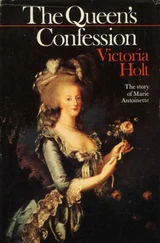Виктория Холт - Flaunting, Extravagant Queen
Здесь есть возможность читать онлайн «Виктория Холт - Flaunting, Extravagant Queen» весь текст электронной книги совершенно бесплатно (целиком полную версию без сокращений). В некоторых случаях можно слушать аудио, скачать через торрент в формате fb2 и присутствует краткое содержание. Жанр: Исторические любовные романы, на английском языке. Описание произведения, (предисловие) а так же отзывы посетителей доступны на портале библиотеки ЛибКат.
- Название:Flaunting, Extravagant Queen
- Автор:
- Жанр:
- Год:неизвестен
- ISBN:нет данных
- Рейтинг книги:5 / 5. Голосов: 1
-
Избранное:Добавить в избранное
- Отзывы:
-
Ваша оценка:
- 100
- 1
- 2
- 3
- 4
- 5
Flaunting, Extravagant Queen: краткое содержание, описание и аннотация
Предлагаем к чтению аннотацию, описание, краткое содержание или предисловие (зависит от того, что написал сам автор книги «Flaunting, Extravagant Queen»). Если вы не нашли необходимую информацию о книге — напишите в комментариях, мы постараемся отыскать её.
Flaunting, Extravagant Queen — читать онлайн бесплатно полную книгу (весь текст) целиком
Ниже представлен текст книги, разбитый по страницам. Система сохранения места последней прочитанной страницы, позволяет с удобством читать онлайн бесплатно книгу «Flaunting, Extravagant Queen», без необходимости каждый раз заново искать на чём Вы остановились. Поставьте закладку, и сможете в любой момент перейти на страницу, на которой закончили чтение.
Интервал:
Закладка:
‘Oh, Mother, it won’t be like a real parting, will it? I can always write, and you can tell me what to do.’
‘Yes, my child, and I shall give you a list of rules which I want you to promise me that you will read once a month. Will you do this, ’Toinette?’
‘Indeed I will.’
‘Read as much as you can, and finish what you start to read. Do not idly begin a book and then put it aside because you wish to dance and play – as you have done so often, my darling. I fear that you will forget to say your prayers, that you will become neglectful of your duties, and lazy. Suppress these faults, my dearest child. Remember that I am thinking of you constantly, that I am praying for you, and that any appeal from you will never fail to touch my heart, and that I would give my life to see you happy.’
There were tears in Antoinette’s eyes now. She looked at her mother with alarm, and realised in that moment how very much she was going to miss her.
The climax of the ceremonies had been reached; the balls and banquets, the reviews and theatrical performances were over, and at them all the young girl had appeared in the rich garments which had been made especially for these occasions. The people of Vienna had cheered their Archduchess whenever she had appeared: they had delighted in her beauty, sighed over her youth. ‘She is so young to leave her home and go far away to another Court,’ they murmured. But they rejoiced in the ceremonies; and the splendour of the emissaries of Louis was such as to make them gasp with wonder.
There came the great day – the day of the marriage.
Antoinette stood at the altar in the Augustinian Church and, with Archduke Ferdinand proxy for the Dauphin of France, Marie Antoinette became the Dauphine.
It was bewildering but not yet alarming, for she still had her mother constantly at her side and her friends about her. She still felt herself to be their little darling, their little pet.
But that state of affairs could not last long. Her mother had often explained the importance of etiquette in the Court of France. She was reminded again and again that the King of France, whom she must now think of as her grandfather, was insisting that she must completely forget her Austrian nationality. When she journeyed into France her clothes must be French; even her shift must be a French shift; and because the French were very formal in their Court ceremonies, the young Dauphine was to be handed over to her new country at a certain ceremony, and this was to take place in a building which had been erected for the purpose on a sandbank in the Rhine.
‘Why could it not be here,’ asked the bride, ‘if it has to be done?’
‘Because,’ explained her mother, ‘the French would wish it to be carried out on French soil, and we on our own soil. This is a compromise. It is to be in neutral territory, and that satisfies both sides.’
‘Mother, sometimes I think it is like a war rather than a marriage between two countries.’
‘We must constantly bear in mind French etiquette.’
‘I cannot but bear it constantly in mind, for I hear of nothing else. I shall no longer call my new country the land of the French; I shall call it the land of the Etiquette.’
‘ ’Toinette, my dearest, curb your levity. You laugh too readily.’
‘Mother, I am afraid that when I leave you I shall cry too readily.’
Her mother could not refrain from embracing her daughter, remembering that there was not much time left for embraces.
And the next day their final farewells were said, and the procession made its way through North Austria to the frontier.
Sitting in her coach, magnificently dressed, sat the lonely little Dauphine, and as the procession passed slowly through the land the people crowded to the roadside to look at the child who so recently had been their Archduchess and now had a grander title.
‘Good luck,’ they cried. ‘Long life and happiness!’
Temporarily she forgot her grief as she bowed and smiled and waved to them.
‘She is a little enchantress,’ the people said to each other. ‘The French will love her. How could they do otherwise?’
They were strange days for Antoinette. She was bewilderingly unhappy at times, feverishly gay at others. Such fêtes and banquets were arranged for her in the various towns in which they spent the night, and during the long delays at the posting stations where the three hundred and forty horses in the procession had to be changed before they could go on; her friends and maids of honour from her mother’s Court grew sadder as the journey proceeded; for they knew that when they reached that sandy stretch of neutral territory they would be forced to say good-bye to their little mistress.
And at length they came to that hastily constructed building which consisted of two small rooms facing the left bank of the Rhine, a hall in the centre of the building and two similar rooms facing the right bank.
It was in this building that Marie Antoinette was to realise how the French could be almost farcical in their love of formality.
When they arrived she was led into one of the rooms on the right-hand side of the great hall. Several of her Austrian attendants were with her and, waiting for her in this room, was the Comtesse de Noailles.
When Marie Antoinette entered, the Comtesse fell to her knees, took the girl’s hand and kissed it.
‘I am at your service, Madame la Dauphine,’ she said. ‘I am honoured to be your lady-in-waiting-in-chief.’
Antoinette smiled and cried in her halting French: ‘Oh, pray do not kneel. We shall be great friends, I am sure.’
The Comtesse looked surprised and rose to her feet; she stood back as though waiting.
Two of the Austrian women unbuckled the Dauphine’s girdle, and began stripping her of her clothes.
‘But I am cold,’ cried Antoinette petulantly.
‘We will be quick, dearest …’ began one of the women and, catching the Comtesse’s eyes upon her, added quickly: ‘Madame.’
‘I know I am to wear a French dress,’ said Antoinette, ‘but pray be quick.’
The Comtesse had come forward and was giving instructions to the Austrians. ‘Everything must be removed … every single thing,’ she said.
‘You shall not take my shift,’ protested Antoinette.
‘Madame, you cannot enter French territory wearing anything but French garments,’ insisted the Comtesse.
Antoinette was now completely naked, shivering before them all, angry, feeling herself shorn of her dignity; but she felt too frightened to protest, because she suddenly realised that she was shedding more than her clothes.
Madame de Noailles slipped the French silk shift over her head and, taking pity on the shivering child, said: ‘These petticoats were made in Paris, and you know, do you not, Madame, that the best petticoats are made in Paris?’
Antoinette could never control her tongue. ‘We make good petticoats in Vienna,’ she said shortly.
Madame de Noailles ignored that. ‘These are French lace,’ she said. ‘And these shoes were made by the royal shoemaker.’ When they had dressed her in her French garments she seemed to be an entirely different person but, as she smoothed the folds of her dress, she knew that the clothes she was now wearing were more becoming than those she had discarded; and miserable as she was the thought gave her some small pleasure.
Madame de Noailles cried out in dismay, for she had discovered a ring on the girl’s finger.
‘My mother gave it to me,’ said Antoinette.
‘It is Austrian, Madame, and His Majesty has given orders that you must not step onto French territory wearing anything which is not French.’
‘I shall not give up my mother’s ring,’ said the girl defiantly.
Читать дальшеИнтервал:
Закладка:
Похожие книги на «Flaunting, Extravagant Queen»
Представляем Вашему вниманию похожие книги на «Flaunting, Extravagant Queen» списком для выбора. Мы отобрали схожую по названию и смыслу литературу в надежде предоставить читателям больше вариантов отыскать новые, интересные, ещё непрочитанные произведения.
Обсуждение, отзывы о книге «Flaunting, Extravagant Queen» и просто собственные мнения читателей. Оставьте ваши комментарии, напишите, что Вы думаете о произведении, его смысле или главных героях. Укажите что конкретно понравилось, а что нет, и почему Вы так считаете.











